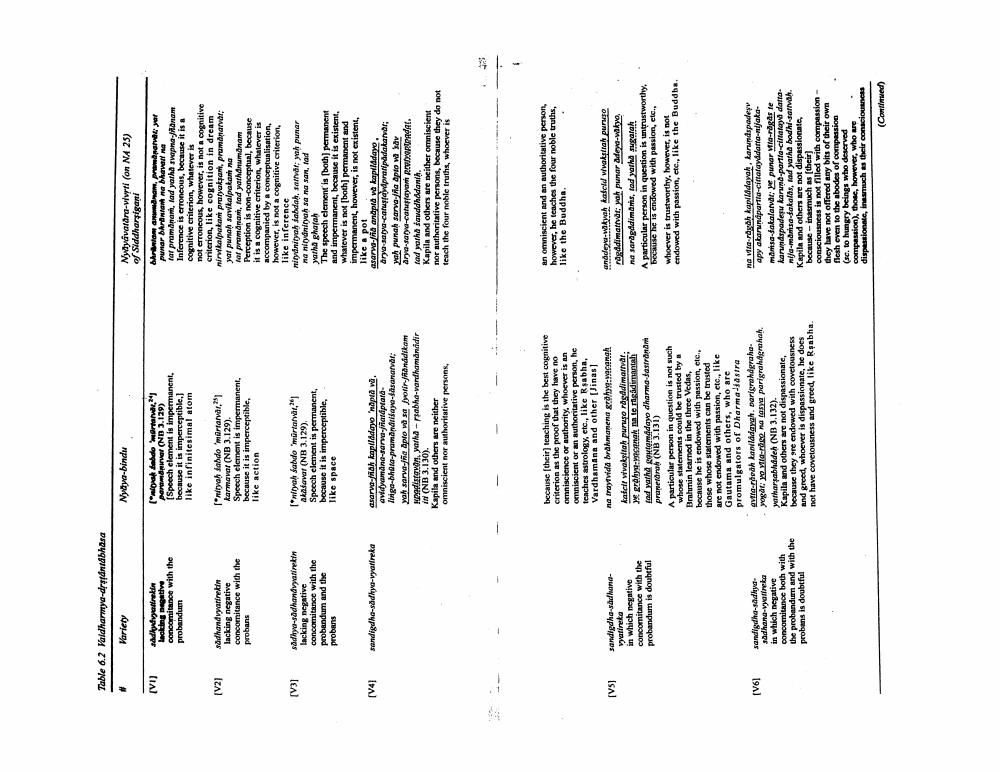________________
Table 6.2 Valdharmya-drânābhāsa
[VI]
[V2]
[V3]
[V4]
[VS]
[V6]
Variety
adkyvyttrekin lacking negative concomitance with the probandum
sadhandvyatirekin lacking negative concomitance with the probans
sadhya-sadhanavyatirekin lacking negative concomitance with the
probandum and the probans
sandigdha-sädhya-vyatireka
sandigdha-sadhanavyatireka
in which negative concomitance with the probandum is doubtful
sandigdha-sadhyasadhana-vyatireka in which negative concomitance both with the probandum and with the probans is doubtful
Nyaya-bindu
("nia abdom@arvar paramanuver (NB 3.129) [Speech element is impermanent, because it is imperceptible,] like infinitesimal atom
[*nityaḥ sabdo 'martarvar,25 karmavar (NB 3.129). Speech element is impermanent, because it is imperceptible, like action
["nityaḥ sabdo 'murtatvät,
akasavar (NB 3.129).
Speech element is permanent, because it is imperceptible, like space
asarva-jääh kapiladayo 'nātā vā, avidyamana-sarva-jñatáptatălinga-bhata-pramandisaya-šāsanatvār
yah sarva-Jña apto và sa jyotir-jäädikam upadistavan, yarha-rsabha-vardhamānādir in (NB 3.130).
Kapila and others are neither
omniscient nor authoritative persons,
because [their] teaching is the best cognitivecriterion as the proof that they have no omniscience or authority, whoever is an omniscient or an authoritative person, he teaches astrology, etc., like Rsabha, Vardhamana and other [Jinas] na traytida brāhmaṇena grohya-vacanah kašcit vivaksitaḥ puruso ragddimartvär y grahya:acanak na te rigádimantah tad yatha goutemadayo dharma-dastrāṇā pranetarah (NB 3.131)
A particular person in question is not such whose statements could be trusted by a Brahmin learned in the three Vedas, because he is endowed with passion, etc... those whose statements can be trusted are not endowed with passion, etc., like Gautama and others, who are promulgators of Dharma-iastra avita-räväh kanilådayah. Darigrahdgrahayogat: yo vila-rigo na tasya parigrah@grahah. yatharṣabhadeh (NB 3.132).
Kapila and others are not dispassionate, because they are endowed with covetousness and greed, whoever is dispassionate, he does not have covetousness and greed, like Reabha.
Nyayavatara-vivrti (on NA 25) of Siddharsigani
bhrăniam anumānam, pramāṇarva: yar punar bhränta na bhavati na
tat pramanam, tad yatha svapna-janam Inference is erroneous, because it is a cognitive criterion, whatever is not erroneous, however, is not a cognitive criterion, like cognition in dream nirvikalpakam pratyakşam, pramaṇarvär; yat punaḥ savikalpakam na
tat pramanam, tad yathanumanam Perception is non-conceptual, because it is a cognitive criterion, whatever is accompanied by a conceptualisation, however, is not a cognitive criterion, like inference
nityânityah labdaḥ, sattvät; yah punar na nityanityaḥ sa na san, tad
yatha ghatah
The speech element is [both) permanent and impermanent, because it is existent, whatever is not [both] permanent and impermanent, however, is not existent, like a pot
asarva tòa anh pô và kaplladayo arya-satya-catustayapratipadakatvät; yah punah sarva -jna opto và sơn Arya-satya-catustayaṁ protxaripadat. tad yatha sauddhodaniḥ.
Kapila and others are neither omniscient nor authoritative persons, because they do not teach the four noble truths, whoever is
an omniscient and an authoritative person, however, he teaches the four noble truths, like the Buddha.
anadeya-vakyah kabeld vivaksitaḥ puruso ragadimattvät; yah punar adeya-vakyo, na sarāgādināms, tad yatha sugatah A particular person in question is untrustworthy. because he is endowed with passion, etc., whoever is trustworthy, however, is not endowed with passion, etc., like the Buddha.
na vita-rāgāḥ kapilddayaḥ, karundspadev apy akaruṇapartia-cittatayddatta-nijakamamsa-sakalatvar; ye punar vila-rāgās te karundspadesu karuno-partia-cillataya datta nija-mama-sakalas, tad yatha bodhisattvak. Kapila and others are not dispassionate, because - inasmuch as [their] consciousness is not filled with compassionthey have not offered any bits of their own flesh even to the abodes of compassion (sc. to hungry beings who deserved compassion), those, however, who are dispassionate, inasmuch as their consciousness
(Continued)
W




